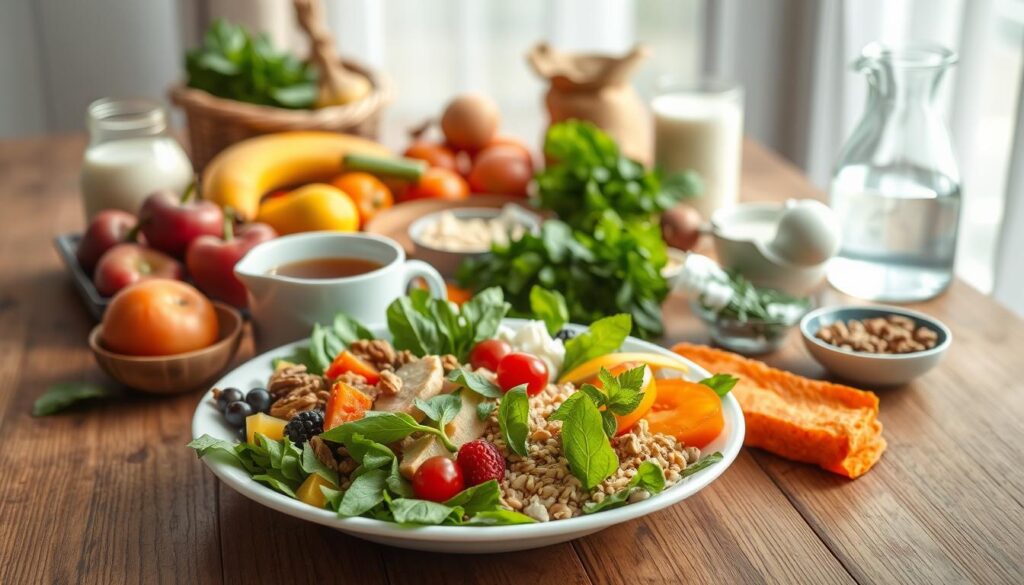Ever thought about how your food might affect your sleep? A balanced diet is key to better sleep, acting as a natural cure for sleepless nights. By linking nutrition to sleep, you can choose foods that help you rest better. Studies show that bad eating habits can lead to poor sleep, making healthy food choices vital.
Key Takeaways
- A balanced diet can significantly enhance your sleep quality.
- Nutrition for better sleep involves specific dietary practices and nutrient choices.
- Understanding how food affects sleep can lead to healthier sleep patterns.
- Poor sleep is often a consequence of unhealthy eating habits.
- Make informed food choices to improve sleep with good nutrition.
Understanding the Sleep and Diet Connection
The connection between food and sleep is key to good health. What you eat can greatly affect your sleep quality. Studies reveal that bad food choices can disrupt sleep.
People who eat less fruits, veggies, and whole grains often sleep less. They also wake up more during the night.
On the other hand, eating healthy, like the Dietary Guidelines suggest, can lead to better sleep. A good diet helps you sleep longer and more soundly. This shows how diet and sleep are linked.
Quality sleep also helps you eat better. It’s a cycle that benefits your health in many ways.
Making smart food choices can boost your sleep and health. Eating a variety of nutritious foods is the first step. It helps you sleep better and feel better overall.
Balanced Diet for Better Sleep
Your overall health greatly affects how well you sleep. A balanced diet helps create a good sleep environment. Eating whole foods like fruits, vegetables, and lean proteins gives you the vitamins and minerals you need for sleep.
Research shows that eating anti-inflammatory foods can improve sleep. Foods like fatty fish, nuts, and olive oil are great for both your body and sleep. Adding these to your meals can help regulate your sleep patterns.
Try eating sleep-inducing foods in the evening. This can help your body get ready for sleep. A diet rich in nutrients can lead to better sleep every night.
The Role of Macronutrients in Sleep Quality
Learning about macronutrients and sleep shows how diet affects rest. Carbohydrates and proteins are key to sleep. Knowing their effects helps you eat better for sleep.
Importance of Carbohydrates
Carbs are vital for a good night’s sleep. Opt for complex carbs like whole grains. They help make serotonin, leading to melatonin.
Try oatmeal or brown rice for dinner. They calm you down and support sleep hormones.
The Impact of Proteins on Sleep
Proteins are linked to better sleep, thanks to tryptophan. Foods like turkey and nuts boost serotonin and melatonin. But, big meals or fats can upset digestion and sleep.
| Macronutrient | Source Foods | Sleep Impact |
|---|---|---|
| Carbohydrates | Oatmeal, Brown Rice, Whole Grain Bread | Enhances serotonin and melatonin production |
| Proteins | Turkey, Dairy, Nuts | Supports serotonin synthesis but can disrupt sleep if heavy |
Sleep-Inducing Nutrients to Include in Your Diet
Eating a balanced diet with sleep-inducing nutrients is key to better sleep. Foods rich in essential vitamins for sleep can help you sleep deeper. Choosing nutrient-dense foods improves sleep hygiene and overall health.
Essential Vitamins and Minerals
Many vitamins and minerals help improve sleep quality. Magnesium relaxes your muscles and promotes sleep. Vitamin D helps regulate sleep cycles. Omega-3 fatty acids support brain health and may help with insomnia.
Eating foods like leafy greens, nuts, fish, and fortified cereals gives you these important nutrients.
Foods Rich in Tryptophan
Tryptophan is an amino acid that helps make neurotransmitters for sleep. Eating tryptophan-rich foods supports natural sleep patterns. Turkey, nuts, beans, and dairy are great sources.
Adding these foods to your meals can help you fall and stay asleep better.
Healthy Eating for Sleep: Recommended Foods
Your diet greatly affects how well you sleep. Eating certain foods can improve your sleep quality. Focus on fruits, vegetables, and whole grains for a balanced diet that supports sleep.
Fruits and Vegetables Beneficial for Sleep
Some fruits can help regulate your sleep cycles. Add these to your diet:
- Bananas: High in potassium and magnesium, which relax muscles.
- Cherries: Natural source of melatonin, important for regulating sleep.
- Kiwi: Studies suggest it may improve sleep onset and duration.
- Leafy Greens: Rich in nutrients that support overall health and wellness.
- Colorful Vegetables: Provide essential vitamins for bodily functions related to sleep.
Whole Grains and Fiber Sources
Whole grains are linked to better sleep. They promote digestion and improve sleep quality:
- Oats: Contain melatonin and are also high in fiber, which can keep you feeling full.
- Quinoa: A complete protein that can provide steady energy without spikes in blood sugar.
- Brown Rice: Offers a source of complex carbohydrates that can help keep blood sugar stable.
Foods to Avoid for Better Sleep
Some foods can really mess with your sleep. Knowing which ones to skip can make a big difference. Caffeine and alcohol are big no-nos for sleep. It’s important to understand how they affect your rest.
Impact of Caffeine on Sleep Quality
Caffeine can really mess with your sleep. You might drink coffee in the afternoon to stay awake. But, this can make it hard to sleep at night.
Even if you think you’re not drinking too much, caffeine can keep you awake. It makes it tough to fall asleep.
Disrupting Effects of Alcohol and Heavy Meals
Alcohol might seem like it helps you sleep, but it doesn’t. It actually messes with your sleep cycles, making you wake up a lot. Heavy meals, like those with lots of fat or spice, can also ruin your sleep.
When you eat these foods close to bedtime, your body has trouble digesting them. This makes it hard to get a good night’s sleep.
To sleep better, try to cut down on caffeine, alcohol, and heavy meals before bed. Making these changes can help you sleep more peacefully and feel better overall.
Best Time to Eat for Optimal Sleep
When you eat can affect how well you sleep. Eating at regular times helps your body digest food better. It also helps your body’s clock stay in sync with day and night.
Make sure to eat your last meal two to three hours before bed. This lets your body digest food well, making it easier to fall asleep. Eating too close to bedtime, like processed foods, can mess up your sleep. It’s important to eat mindfully to improve sleep quality.
Following chrononutrition, or eating with your body’s clock, can also help. Eating at the same times every day can lead to better sleep. Try to make a routine that fits your sleep cycle for the best results.
Creating a Sleep-Friendly Eating Routine
Creating a routine for better sleep means thinking about when and what you eat. Eating at regular times helps your body get into a sleep rhythm. This approach, called chrononutrition for better sleep, boosts your health and sleep quality.
Consistent Meal Timing and Chrononutrition
Eating at the same times every day sets your internal clock. This helps your body prepare for sleep. Eating meals and snacks at set times can improve digestion and energy.
Studies show that meals full of nutrients can also improve sleep. For more tips on healthy eating, check out the guide on healthy eating for families.
Healthy Snacking Before Bed
Having healthy pre-bedtime snacks is key to a good sleep routine. Yogurt or a small handful of nuts are good choices. They have magnesium and tryptophan, which help you sleep.
Eating these snacks an hour before bed is best. It lets your body relax without upsetting your stomach.
Additional Tips for Improving Sleep through Nutrition
Improving your sleep quality is more than just what you eat. Try a holistic approach to sleep with different strategies. Keeping a regular sleep schedule helps your body’s clock stay in sync. Doing relaxing things before bed, like reading or meditating, tells your brain it’s time to relax.
Also, cutting down on screen time in the evening can help you sleep better.
Your daily food choices are key for nutrition for sleep improvement. Eat whole foods all day and drink enough water. Foods rich in antioxidants, like berries and leafy greens, help keep you healthy and sleep well. Everyone reacts differently to food, so find what works for you.
If you want to improve your diet, check out this in-depth resource on balanced eating and macronutrients. These additional sleep tips can make your sleep and overall health better.
Conclusion
Understanding how nutrition affects sleep is key to better rest. The foods you eat, from carbs to proteins, impact your sleep quality. Eating a balanced diet with sleep-friendly foods helps your evening routine.
It’s important to make smart food choices for good sleep. Eating at regular times and choosing the right snacks before bed helps. These habits are part of a bigger sleep hygiene plan.
Good nutrition is vital for your health. By focusing on what you eat, you can improve your sleep. This leads to better health and more energy.






